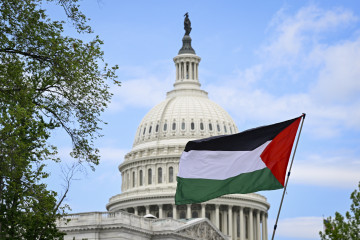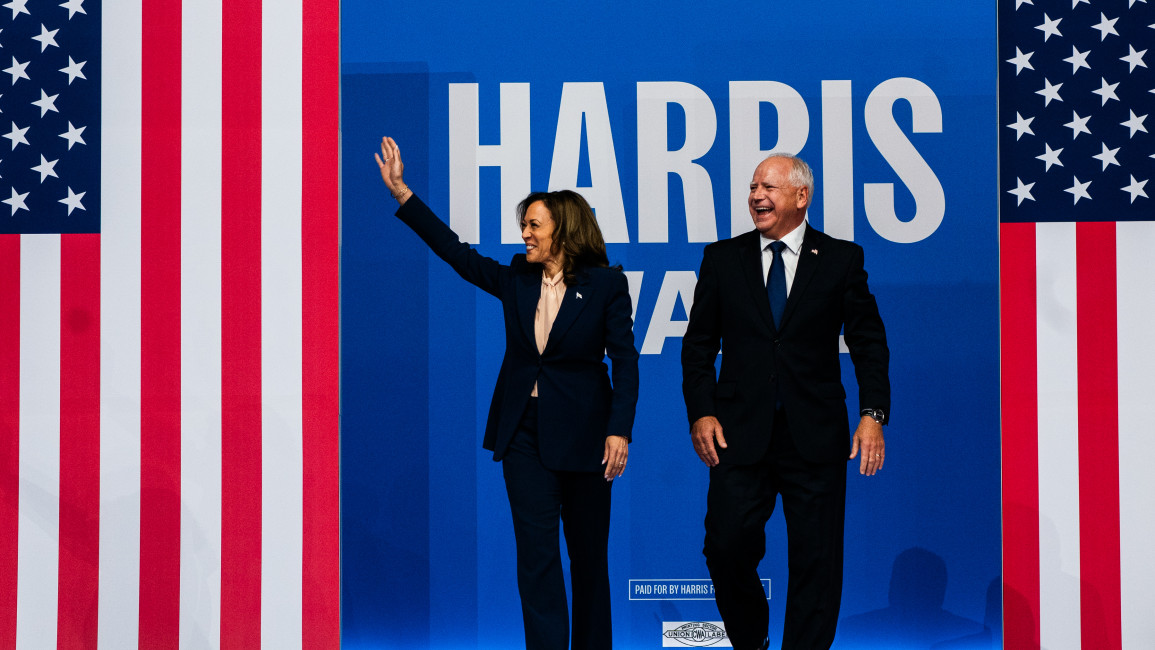

Washington, DC - For many activists, having the ears of political insiders would be a dream come true. But the reality often means a difficult balancing act between remaining true to their cause and pushing for difficult policy change on the inside.
This delicate balance was on display last month during the Democratic convention in Chicago, where advocates for Palestinian, Arab and Muslim human rights, some of them elected officials, split their time between holding meetings with Democratic insiders and standing alongside protesters outside the arena.
It was also on display again this week when the Muslim American voter advocacy group Emgage issued their endorsement for Vice President Kamala Harris.
The Muslim American political organisation, however, still expressed serious concerns with her Middle East policies, but it would prefer Harris’ ear over Donald Trump’s in the Oval Office in the belief she would be more likely to listen to them on Palestine and other issues.
A difficult and strategic balance
"The balance that needs to be made is to be both relevant and principled," James Zogby president of the Arab American Institute, told The New Arab.
"Too often, the tendency is of working on the inside being unprincipled and maintaining access, or being on the outside and making yourself too assertive to the point of making yourself irrelevant. We're seeing that in full measure in this election."
Zogby, a veteran pollster who founded the American Arab Institute in 1985, has been involved in US politics even longer and can remember when Arabs and others of Middle Eastern descent barely had a voice in mainstream American politics.
"There's obviously been a change. Despite the fact that there haven't been the policy changes we want, we're recognised as a constituency. Forty years ago, we didn't exist [to the political establishment]," he says.
He noted that until the last couple of election cycles candidates from both major parties would reject Arabs' endorsements. Now, candidates from both parties are seeking the endorsements of Arabs and Muslims.
"Some people say you're looking at a glass half full, but I say no, I remember a time when we didn't have a glass," he says.
No partner on the inside for eight years
Zogby recalls that under former presidents Bill Clinton and Barack Obama they had meetings in which they were able to produce small changes related to the region, mainly on immigration, as well as policy in Lebanon.
This, he says, didn't happen under Donald Trump, who on day one as president signed a Muslim ban, or even under Joe Biden, whose first executive order was to reverse this ban.
Biden, to the disappointment of Arabs and Muslims across the US, has continued some of Trump's key policies in the region, including keeping the US embassy in Jerusalem, moving forward with the Abraham Accords, keeping Trump's recognition of the long-time occupied Golan Heights as belonging to Israel, and not rebuilding the State Department's immigration infrastructure that Trump largely dismantled.
Moreover, since the outbreak of Israel's war in Gaza in October, which has killed more than 41,000 Palestinians in the besieged enclave, Biden has made it clear that he stands by right-wing Israeli Prime Minister Benjamin Netanyahu, despite multiple polls showing that the majority of Americans support a ceasefire.
"For the inside game, it's a two-way street. In the past eight years, we haven't had a partner on the other side," Zogby says. "You can work on the inside, but you do need the administration to be responsive. That hasn't happened in a while."
Hope in Harris?
In light of widespread disappointment in Biden among Arabs, Muslims and their allies, many are sceptical of Kamala Harris, whose presidential campaign was launched from her position as vice president in the same administration.
Those who have met with her, including Layla Elabed, a leader in the uncommitted movement, which drew more than 100,000 "uncommitted" votes in Michigan in protest of Biden's support for Israel's war in Gaza, have reported that the vice president has expressed empathy for civilians in Gaza.
However, other than offering words of empathy, Harris hasn't offered much in the way of policy promises on Israel and Palestine, granted, a difficult position to be in given her role as vice president whose job is to support the current administration.
When Emgage Action announced its endorsement of Harris on Wednesday, it did not give the enthusiasm typically shown to a candidate. In its statement, the Muslim voter advocacy group explained why they did not support Trump and that they held the Biden administration responsible for Israel's war in Gaza. Harris, they reasoned, is the best option compared with Trump, the only other major-party candidate.
"To prevent Trump from returning to the White House, Emgage Action is endorsing Vice President Kamala Harris and Governor Tim Walz for President and Vice President," reads Emgage Action's statement. "This endorsement is not an agreement with Vice President Harris on all issues, but rather, an honest guidance to our voters regarding the difficult choice they confront at the ballot box."
|
|
Looking strategically to the future
Even as many Arabs and Muslims working both inside and outside the political system express disappointment in US Middle East policy, there also exists a strong sense of duty to represent and engage communities that have largely felt unseen in US politics.
"We have to build our institutions, follow the processes and mobilise our communities," Wa'el Alzayat, CEO of Emgage, tells TNA. "You don't disengage, you don't give up, you stay strategic. Our view is that third parties, especially in swing states, could bring about difficulties for our communities."
For Alzayat, the aim is to restore hope and give direction when there’s frustration in the community.
“Each one is presented as worse than the other. A third party is sometimes seen as a way to register disapproval. We're trying to show that we have a shot at advancing the entire agenda," he says.
"We have to be committed to the entire struggle beyond the elections. The Democratic Party is changing. What we're seeing up close is the change process. We want that to give people hope."
Iman Jodeh, a Democratic member of the Colorado House of Representatives and the only Palestinian and Muslim in the state to hold her position, is well aware of the importance of having a seat at the table.
"I think because I'd been advocating in the [state] Capitol before I was elected, I had a good sense of what advocacy looked like on the other side. Sometimes those fights are incredibly difficult," she tells TNA.
"I don't have a vote that influences foreign policy at the state level. But what I do have is a relationship with my congressional delegation. My responsibility is to share what I'm hearing about Palestine. If I can leverage those relationships, that's how I'm able to use my position as an elected official to advocate for Palestine, but I'm doing it very strategically," she says.
She recalls someone suggesting that she switch to the Green Party, a move she believes would not be a good strategy.
"OK, then what? I wouldn't be in the room to influence my colleagues and to educate them. In Colorado, we [Democrats] have the supermajority in the House. I don't take it lightly. We need to use that voice," she says.
Like many other Democrats, Zogby sees support for the Green Party in a presidential election as lacking a strategy for achieving a progressive agenda.
People who support Green Party candidate Jill Stein, he says, "think they're being principled. But they're making themselves marginalised and irrelevant".
He also urges activists against what he sees as counterproductive slogans, such as calling for an arms embargo. Instead, he suggests advocating for the US to follow its own laws, such as the Leahy Act, which prohibits the US from providing equipment to a foreign military suspected of committing gross human rights violations. This, he argues, could more effectively achieve the same goal.
It is no doubt difficult to navigate between a political establishment supporting Israel's war in Gaza, and a segment of voters whose frustration continues to grow over a lack of significant change in US foreign policy.
"We straddle both worlds," says Alzayat. "It's challenging for people to understand that and for us to do it. We don't want to only be an establishment organisation or only be a community organisation and detached from decision making."
Brooke Anderson is The New Arab's correspondent in Washington DC, covering US and international politics, business, and culture.
Follow her on Twitter: @Brookethenews





 Follow the Middle East's top stories in English at The New Arab on Google News
Follow the Middle East's top stories in English at The New Arab on Google News


